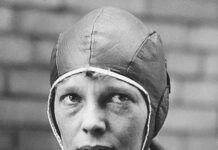
Hemsley Winfield the “Father of African American Modern Dance”
By Mary Hoar, City of Yonkers Historian, President Emerita Yonkers Historical Society, recipient of the 2004 Key to History, Yonkers Landmarks Preservation Board Member, Chair of Revolutionary Yonkers 250 and President Untermyer Performing Arts Council
Monday, November 4th
November 4, 1927: Commander Richard E. Byrd, the first man to fly over the North Pole, addressed Yonkers students and residents at Roosevelt Junior High School.
November 4, 1943: People had to travel to New York City to get needed prescriptions filled Sunday nights because local pharmacists were closing businesses Sunday nights.
After receiving many complaints from Yonkers’ residents, Mayor Barnes announced he was taking action! Barnes contacted the Federal Trade Commission to ask the situation be investigated, and asked about the legality of “shutting off the supply of such a necessary service” to Yonkers. He then asked the Council to ensure our City Pharmacist be on duty during those hours so Yonkers residents could get essential prescriptions filled.
Tuesday, November 5th
November 5, 1918: For the first time, Yonkers women exercised their right to vote.
November 5, 1928: The “voice of the sky” was heard for the first time in Yonkers when a tri-motor airplane, equipped with giant speakers and amplifiers, flew over Yonkers broadcasting campaign information for Mayor John Fogarty.
November 5, 1942: Approximately two hundred workers on two 10-hour shifts at Arthur G. Blair shipyards on Alexander Street began converting a 225-foot ship to war use, adding protection against magnetic mines.
Wednesday, November 6th
November 6, 1910: Robert Peary, credited with the discovery of the North Pole, spoke at a First Presbyterian Church Men’s Association dinner.
November 6, 1941: The Herald Statesman announced “new sources of information” revealed Westchester County defense work contracts had risen to $46 million, with Yonkers leading with contracts totaling close to $17 million. Some of the Yonkers defense companies were Habirshaw Cable and Wire, Otis Elevator, Campbell Hat, NY Engineering, US Industrial Chemical, NY Guild for the Blind, and Cameo Curtains. Other local companies were subcontractors for the larger companies: Graphite Metallizing manufactured gun emplacement brushes and self-lubricating bearings; Jerome Knitting Mills produced gloves; Saunders Plumbing created machine tools; and Joseph Love Inc. (children’s dresses) made cloth products.
Thursday, November 7th
November 7, 1924: Lu Chow, head of the notorious Hip Sing Tong, was arraigned before Judge Boote, charged with illegal gun possession. The good judge suspended the charge, pending outcome of more serious charges against Chow in the Big Apple.
Yonkers Homicide Squad detectives took Chow, arrested in a raid at 8 Herriot Street, to Manhattan to face the charge of murdering a Corona tearoom owner with a hatchet. Trailing and guarding the Yonkers Police car were five Hip Sing Tong men in a car; they were afraid a rival gang would try to assassinate Chow to avenge the murder. All arrived at the New York Court without incident.
November 7, 1925: Father John Flynn, Rector of St. John the Baptist Parish, notified Hemsley Winfield, Creator and Director of the Little Theatre, the group had to vacate the former parish church immediately. Father Flynn had rented the vacant building to Winfield’s performing group a week earlier; he had to tell Hemsley the community was incensed by the project, and threatened to mob the playhouse.
Winfield, “Father of African American Modern Dance,” planned to inaugurate the site by presenting a series of productions featuring well-known artists and celebrities, including New York Globe theater critic Kenneth McGowan, Provincetown Playhouse’s Louis Barrington, and African American star Florence Mills; other prominent celebrities promised to lecture. Winfield planned to teach play writing, stage design and diction at the former church. In less than a week, the company sold more than 100 subscriptions to Winfield’s debut series.
Friday, November 8th
November 8, 1930: Yonkers Police Department Chief Edward Quirk announced all future applicants for revolver permits would be fingerprinted and photographed, enabling YPD to have a complete record of their identities.
November 8, 1955: Otis Elevator exhibited their new “Elevoice” at the National Hotel Exposition in the Kingsbridge Armory. “Elevoice” made floor stop and directional announcements on Otis’ automatic elevators. It also announced if a passenger was blocking doors, preventing them from closing.
Saturday, November 9th
November 9, 1914: George T. Kelly won the contract to build the new YMCA with a bid of $122,268.
Among the many local buildings Kelly built were Gorton High School, Proctor’s Theater, Glenwood Gardens, Church of the Monastery of the Sacred Heart and Yonkers City Hall!
November 9, 1925: International dancing star Bill Robinson headlined Proctor’s “good, clean” vaudeville bill. Robinson, touted as “The Dark Cloud of Joy,” was one of the “fastest and cleverest dancers on the stage,” a great athlete and an excellent comedian. Considered by many to be the most famous African American in show business, he appeared in nightclubs, stage productions, and motion pictures, including films with Shirley Temple.
November 9, 1927: One of the happiest political celebrations Yonkers witnessed followed the election of Thomas Larkin as Mayor. More than two thousand people milled around his Post Street home, then drove him around Yonkers, forming an impromptu victory parade to Yonkers’ Democratic Headquarters on Main Street.
Sunday, November 10th
November 10, 1915: Yonkers Women Suffrage Association members unanimously approved this resolution: “Resolved, That to men of Yonkers the thanks of the Yonkers Woman Suffrage Association are given for the splendid vote by which our city—a leader in progress and population in the Empire State—has declared itself for the first and greatest principle of democracy—government for the people, by all the people.”
November 10, 1942: Rotary Club Secretary Arthur Witte recommended Yonkers Rotarians giving rides to hitchhiking soldiers, sailors or marines, ask the serviceman for his mother’s address. Why? To write a note to the mom, sharing the Rotarian had met her son in Yonkers… and her son looked just fine!
Questions or comments on this column? Email YonkersHistory1646@gmail.com.
For information on the Yonkers Historical Society, Sherwood House and upcoming events, please visit our website www.yonkershistoricalsociety.org, call 914-961-8940 or email info@yonkershistoricalsociety.org.





